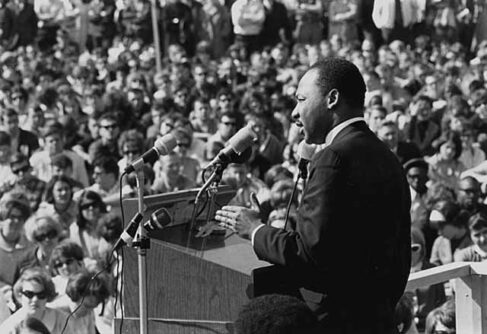An Economics 101 class presents a highly idealized version of economic activity, with purely self-interested actors buying and selling goods in the marketplace, with prices set purely by the laws of supply and demand. In Economics 101, there’s just a “market”—it’s not an American marketplace, or a European or sub-Saharan Africa marketplace, and it doesn’t matter if the buyers and sellers are Catholic or Jewish, and there is no reference to courts that enforce contracts or threats from pirates who might steal goods.
And, this highly idealized version of economic activity isn’t just what students learn in introductory economics classes—many academic economists conduct specialized economic research based on these assumptions.
But, of course, markets do work differently in countries with sound money and secure property rights as compared to those with unstable currency and insecure rights. People often make economic choices—such as giving to charity—that are not simply self-interested. Different cultural assumptions in the Roman Republic, in Feudal Europe, and in industrializing Europe had consequences for people’s economic decisions. Institutions like the family, courts, universities, and churches pervasively shaped economies.
Sounds obvious, right? Well, economists did not take institutions much into account prior to the work of Nobel laureate economist Douglass North, who died last week at the age of 95. North’s great contribution was to show that it is not enough for economists to understand markets. Additionally, economists must understand the institutions that set the parameters for market activity.
North developed formal theories of how economies and individual choices are shaped by institutions. He was especially interested in exploring how economic choices is shaped by property rights, the state, and what he called “ideologies” or assumptions that guide people’s behavior and views of right and wrong.
If any of these institutions change, people’s economic choices will also eventually change, with positive or negative consequences for economic growth. North showed how some institutional arrangements are much more conducive to promoting economic growth than others, in studies from his early book The Economic Growth of the United States: 1790–1860 to his sweeping survey of institutional arrangements from human’s hunting and gathering stage to the 20th Century, Structure and Change in Economic History.
North’s work is particularly important for those interested in philanthropy. On one hand, it illuminates what institutional arrangements are most conducive to the creation of wealth that supports philanthropy on a certain scale.
But, even more importantly, North’s theories tackle what might look utterly irrational, namely the philanthropist’s giving away of money and time without getting anything in return. To economists who assume everyone is purely self-interested, the philanthropist looks like a fool. However, it’s simply the case that, North wrote, that “everyday observations provide abundance evidence that individuals obey rules [and make selfless choices] when an individualistic calculus should have them act otherwise.”
North insisted that economists should account for the everyday fact of people making choices that aren’t simply self-interested, and he developed theories about why reasonable people donate blood, give away money, and act altruistically. In doing so, he gave us an economic theory that can help us make sense of the vital institutions of civil society.






